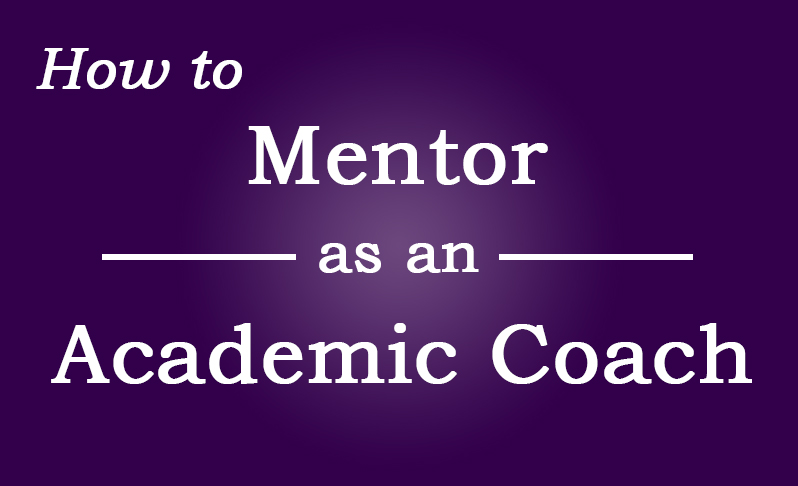A good academic mentor is also a good coach. As Pamela Hieronymi says, “Educators are coaches, personal trainers in intellectual fitness. (Tweet this quote.) The value we add to the media extravaganza is like the value the trainer adds to the gym or the coach adds to the equipment. We provide individualized instruction in how to evaluate and make use of information and ideas, teaching people how to think for themselves.” Think about a coach you had in Little League or high school soccer and all the functions s/he had to perform:

- Teacher. On one hand, your coach had to inculcate the rules of the game in you so that you wouldn’t be off-side in soccer or fail to get the ball across half-court in ten seconds in basketball. But the bulk of the coach’s teaching was in skills. Do you remember his/her methodology? Skills were broken down into their components, usually called “skill points,” each skill point was practiced, and then the parts were put together to learn the whole. For instance, to teach Little Leaguers and high-schoolers how to pitch, Charlie had to first show how to grip the ball (depending on the type of pitch you wished to throw). Then the windup was broken down into five parts: the stance, the rock backwards, the turn, the leg lift, and the push off. Not to oversimplify, but there were also skill points on the direction the ball faced, the angle of the arm off the shoulder, and the angle of the elbow. Then all the points were combined. While obviously higher ed skills are more complex, the pedagogy is comparable. The best coaches also use visual aids, whether film clips or chalkboard diagrams, because they understand how much better players learn when the eye becomes more important than the ear.
- Motivator. The “Win one for the Gipper” speech, a motif that seemingly appears in every sports movie, is the most obvious example of how an effective coach must judge the emotional levels of the players and periodically in practice and games try to inspire individuals and the team to perform at their highest level possible. A good coach sets the bar high and knows when to and when not to intervene with various types of emotion. A good instructor tries to move students from lower-order thinking skills (i.e., remembering, understanding) upward to the higher-order skills of applying, analyzing, evaluating, and creating. A good coach, then, possesses what the Irish poet William Butler Yeats called “passionate intensity” (“The Second Coming”), and that passion inspires us to perform at peaks we never thought possible. If you are not passionate for what you profess, you’re probably in the wrong game.
- Determiner of Roles. Just as the hardest thing for a coach to do is to cut a player, especially one who has been trying hard but can’t make the grade, so an instructor faces moments when the student must be confronted with failure. But more often coaches have to determine basics such as the line-up/who will be called on. A good coach wants 100% of the team to participate, but that can’t always happen. In class, instructors have to know who to put in groups, how to control alphas, how to inspire groups without alphas, even how to make the role of group secretary seem as important as group facilitator.
- Damage Controller. As Murphy’s Law tells us, if something can go wrong, it will. Runners get picked off and the first option on a game-winning shot can be covered, so coaches try to have a Plan B. Quiz questions turn out ambiguous, technology freezes, guest lecturers get sick, and students aren’t ready to present ideas. A good coach-mentor can’t really win a game, but can put students in a position to do so. (Tweet this quote.)
Author
 Ph.D Hal Blythe writes literary criticism to mystery stories. In addition to the eleven books he’s published with New Forums, Hal has collaborated on four books on a variety of subjects, over 1000 pieces of fiction/nonfiction, and a host of television scripts and interactive mysteries performed by their repertory company. He is currently co-director of the Teaching and Learning Center for Eastern Kentucky University. Meet Hal Blythe.
Ph.D Hal Blythe writes literary criticism to mystery stories. In addition to the eleven books he’s published with New Forums, Hal has collaborated on four books on a variety of subjects, over 1000 pieces of fiction/nonfiction, and a host of television scripts and interactive mysteries performed by their repertory company. He is currently co-director of the Teaching and Learning Center for Eastern Kentucky University. Meet Hal Blythe.



